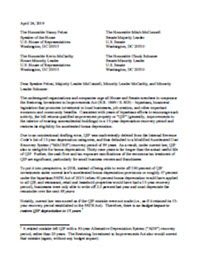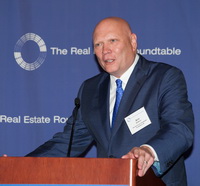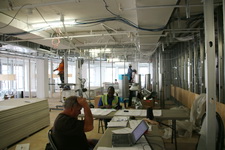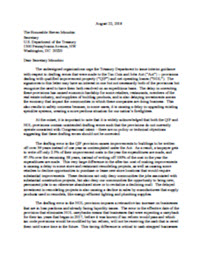A coalition of businesses and trade groups, including The Real Estate Roundtable, today urged all members of Congress to cosponsor the Restoring Investment in Improvements Act (H.R. 1869 / S. 803) – a bill that would correct a drafting error in tax reform. The legislation would give qualified improvement property (QIP) a 15-year depreciation period and restore its eligibility for accelerated bonus depreciation. (QIP Policy Comment Letter, April 26)
 |
|
A coalition of businesses and trade groups, including The Real Estate Roundtable, urged all members of Congress to cosponsor the Restoring Investment in Improvements Act (H.R. 1869 / S. 803) – a bill that would correct a drafting error in tax reform. The legislation would give qualified improvement property (QIP) a 15-year depreciation period and restore its eligibility for accelerated bonus depreciation. (QIP Policy Comment Letter, April 26) |
- House Ways and Means Committee members Jimmy Panetta (D-CA) and Jackie Walorski (R-IN) introduced H.R. 1869 on March 26. The Senate bill (S. 803) was introduced earlier in the month by Sens. Pat Toomey (R-PA) and Doug Jones (D-AL). (Roundtable Weekly, March 15)
- The legislation would correct a mistake in the Tax Cuts and Jobs Act of 2017 that lengthened the cost recovery period for QIP, which generally applies to improvements to the interior of existing nonresidential buildings.
- The error has resulted in a significantly longer 39- or 40-year cost recovery period. The intent of Congress was to allow the immediate expensing of QIP – or provide a 20-year recovery period in the case of taxpayers electing out of new limitations on the deductibility of business interest.
- The April 26 coalition letter to leadership in the House and Senate, as well as leaders of tax committees in both chambers, notes that there is no budget impact to restore the QIP depreciation to 15 years.
- Specific examples are offered in the letter to show the negative consequences that the current law is having on QIP investments and commercial renovation projects. The letter states, “Not surprisingly, it is causing numerous negative ripple effects for individuals and businesses, including on job creation, sales of QIP products and building supplies, property values, building occupancy and rental income, cost-saving energy efficiency gains, and even on fire safety.”
- Roundtable President and CEO Jeffrey D. DeBoer said, “The Restoring Investment in Improvements Act would enact an immediate and necessary correction to the Tax Cuts and Jobs Act. It would reverse an unnecessary drag on building investment, construction activity, and job creation. Congress should move on this common-sense legislation quickly and reinstate a much shorter cost recovery period for building improvements.”
In the weeks ahead, the House Ways and Means and Senate Finance Committees may address “technical corrections” to the TCJA, such as the cost recovery period for QIP along with other tax legislative priorities. (Roundtable Weekly, March 29)




